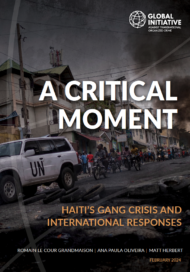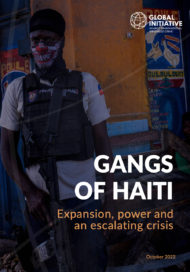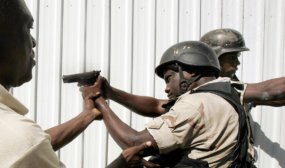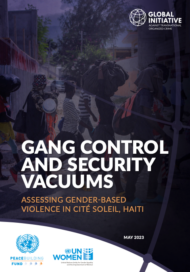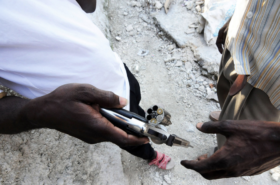Posted on 12 Feb 2024
Over the course of 2023 and early 2024, security has continued to deteriorate alarmingly in Haiti’s capital, Port-au-Prince, and in rural areas in the center and south of the country.
The Haitian crisis worsened critically in 2023. UN reports indicate that in 2023, over 4 789 people were murdered, 1 698 injured, and 2 490 kidnapped, with a 2023 homicide rate of 40.9 per 100 000, more than double the 2022 rate. Besides these figures, the nature of the criminal actors has been profoundly transformed, posing a series of challenges to international intervention.
Over the past years, gangs have undergone a radical evolution, going from rather unstructured actors dependent on resources provided by public or private patronage to violent entrepreneurs who have been able to convert their territorial power into governance capabilities. This shift has been fueled by the gangs’ unprecedented access to firearms and the Haitian state’s inability to halt their expansion, professionalization, and propensity to impose their rule over ever-larger territories, as well as by ongoing collusion by elements of the country’s political and economic elites.
In October 2023, the United Nations Security Council (UNSC) adopted a resolution authorizing a non-UN multinational security support (MSS) mission to Haiti. After lengthy negotiations, the Kenyan government agreed to lead the deployment to support the Haitian National Police (HNP) in addressing gang violence and re-establishing security. However, the planned operation is currently being challenged in the Kenyan courts. This resolution came after the UNSC agreed on a sanctions regime for Haiti in October 2022 and the subsequent imposition of sanctions on key gang leaders, businessmen, and politicians. The UN sanctions have been supplemented by unilateral designations issued by Canada, the US, and the European Union (EU). Further, UN sanctions were levied on gang leaders in December 2023 as the preparations accelerated for the MSS deployment.
The UN’s current initiatives on Haiti potentially augur a new international approach to how organized crime actors can be tackled both from a security and human rights perspective. Ensuring international tools are effective in mitigating harm caused by gangs in Haiti is therefore vitally important for the people of the country and the international community.
Therefore, the various international tools must be tailored to the rapidly evolving criminal and violence dynamics on the ground and implemented in a strategically coordinated fashion.
This policy report is intended to further efforts to tailor both the MSS mission and the sanctions regime to the current operational challenges in Haiti, support Haitian and international decision-makers in their mission, and provide strategic backing to the country’s civil society.
It begins by detailing the current situation on the ground, including gangs and other violent groups’ operations, governance, and territorial domination. The following section describes the mandate and operations of the two primary international tools: the sanctions regime and the MSS mission. The third section flags key issues that need to be considered by both the sanctions regime and the international force and presents opportunities to align the two more comprehensively to strengthen public security responses and public policy initiatives to resolve the crisis.
This report is the first of several planned publications on the political economy of violence in Haiti and the international cooperation that seeks to uproot it. It follows a 2022 report on gang evolution and a 2023 report on gender-based violence in the country.
